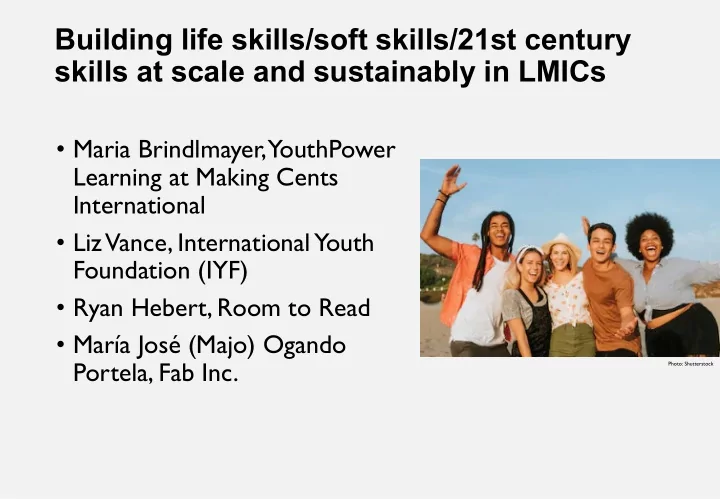

Building life skills/soft skills/21st century skills at scale and sustainably in LMICs • Maria Brindlmayer, YouthPower Learning at Making Cents International • Liz Vance, International Youth Foundation (IYF) • Ryan Hebert, Room to Read • María José (Majo) Ogando Portela, Fab Inc. Photo: Shutterstock 1
Key Soft Skills within the Context of Positive Youth Development (PYD) Maria Brindlmayer YouthPower Learning Senior Knowledge Management Specialist CIES 2019 Photo: YouthPower Learning Advancing solutions to transform the lives of young people
YouthPower Learning: Advancing Solutions to Improve Young Lives What is Positive Youth Development (PYD)? PYD programs recognize youth’s inherent rights and result in youth who have assets , the ability to leverage those assets ( agency ), and the ability to contribute to positive change for themselves and their communities, surrounded by an enabling environment that supports them http://www.youthpower.org/positive-youth-development
Systematic Review Summary Findings And all but one study included soft skills components. Source: Systematic Review on Positive Youth Developing in LMICs, http://www.youthpower.org/systematic-review-pyd-lmics
Many PYD Constructs Are Connected to and Based on Soft Skills Domain>Feature>Construct Domain: Assets Domain: Agency Domain: Enabling Environment Feature: Skill Building Feature: Skill Building Feature: Healthy Relationships and Bonding Training Positive identity Bonding Formal education Self efficacy Opportunities and pro-social Interpersonal skills (social Ability to plan involvement and communication skills) ahead/goal-setting Feature: Belonging and Higher order thinking skills Perseverance (diligence) Membership Recognizing emotions Positive beliefs about the Support future Self control Feature: Norms, expectations and perceptions Academic achievement Prosocial norms Value and recognition Source: Positive Youth Development Measurement Toolkit, http://www.youthpower.org/positive-youth-development-toolkit
Key Soft Skills What is most successful in different sectors/program areas? Source: Key Soft Skills for Cross-sectoral Youth Outcomes, YouthPower Action 2016.
Youth select different skills as important for different environments % of total responses “Select the three most important skills …” 80% 70% 60% 50% 40% 30% 20% 10% 0% Private Live Studies/Job/Entrepreneurship Taught in School Want to strengthen Self-control / Autocontrol Positive self-concept / Autoestima positive Higher order thinking skills / Habilidades de pensamiento de nivel superior Social skills / Habilidades sociales Communication / Aptitudes de comunicación Empathy / Empatía Responsibility / Responsabilidad Positive attitude / Actitud positiva Other (please specify) / Otra Source: YouthLead Survey, 2019; n=27 7
Scaling soft skills teaching and training for sustainability • Many projects are small in scale • Scaling up and embedding soft skills in a national curriculum is challenging • Successful example: IYF’s Passport to Success 8
Measuring soft skills • Measurement tools may be used for different purposes • Different types of measuring, e.g., self-reports, observations by others • Tools often not adapted to local context • Successful example: Life skills measurement at Girl’s Education Program, Room to Read • Measuring self-efficacy and empowerment – comparing boys and girls based on longitudinal data Useful resources: • Measuring Soft & Life Skills in International Youth Development Programs: A Review and Inventory of T ools • Soft Skills for PYD 9
Maria Brindlmayer– maria@makingcents.com YL YouthLead.org YouthLead Global @YouthLeadGlobal www.youthpower.org @YPLearning YouthPower Learning
Recommend
More recommend